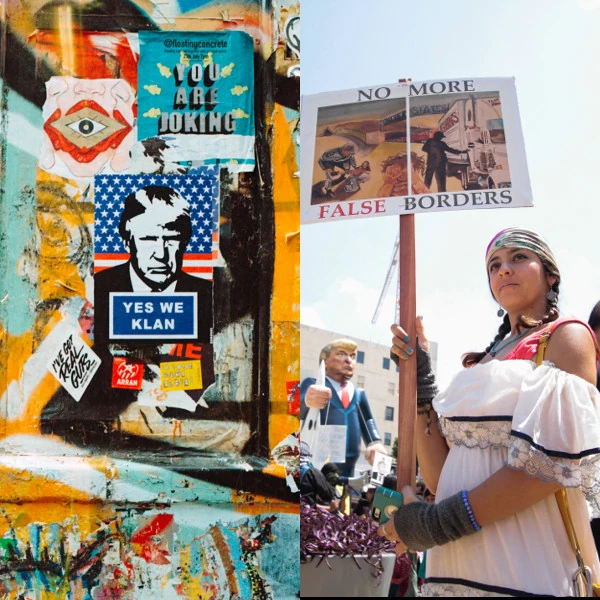Contested Border Crossings in Shifting Political Landscapes:
Anti-Invasion Discourses and Human Trafficking Representations
in US Film and Politics
(pp. 61-82; DOI: 10.23692/iMex.18.5)
 Loading...
Loading...Dr. Lara Martin Lengel

Lara Martin Lengel, PhD, is Professor at the School of Media and Communication, Bowling Green State University. Research informing this study, on human trafficking in Central America, was supported by a Fellowship from the Institute for the Study of Culture and Society. Lengel’s recent refereed research is published in French Journal for Media Research, Journal of International and Intercultural Communication, Studies in Symbolic Interaction, Feminist Media Studies, Global Health Promotion, International Journal of Women’s Studies, and International Journal of Communication. Her most recent publication, on decolonising gender and intercultural communication in transnational contexts, is forthcoming in The Cambridge Handbook of Intercultural Communication, Cambridge University Press.
Dr. Victoria Ann Newsom

Victoria Ann Newsom, PhD, is a Professor of Communication Studies at Olympic College in Bremerton, Washington. Newsom’s research centers on the negotiation of power, gender, and identity in performative and communication contexts. Her current projects include work in international media analysis and activism, peace studies, postcolonial feminism(s), Islamophobia Studies, performative pedagogies, fan and media studies, and cultural studies-grounded analyses of transnational policy making. She has published articles in, among others, the International Journal of Communication, Studies in Symbolic Interaction, Global Media Journal, Communication Studies, Communication Yearbook, Feminist Media Studies, and Journal of International Women’s Studies.
Drawing upon hypermasculine, gun-wielding characteristics associated with the political right and its military industrial complex, this study critiques cinematic representations of the criminal enemy Other in changing political landscapes. Focusing in particular on the filmic representation of Mexicans in recently released US blockbuster film, Rambo: Last Blood (2019), we critique how the current political climate marked by alt-right, ethno-nationalist constructs in the era of Trump has given rise to anti-immigration discourses that reinforce racialised fears and the belief that nationalists are the rightful heirs to white privilege. Through original literary work on the five-film Rambo franchise, we trace the characterisation of John Rambo from Vietnam veteran anti-hero, via Reagan-era champion, to Trump-era anti-hero killing the Other as he invades the US southern border. This most-recent Rambo film evokes the frontier mythology and a fear of the foreign Other encroaching upon the homeland. We critique anti-Mexican and anti-immigration discourses of both Trump and Last Blood, and Rambo’s role necessitating empowering heteronormative masculinity and the American male prominence of the saviour figure. We illustrate topoi underlying these constructs and critique political and cultural influences and audience reception reflecting shifting
Criticando las características hipermasculinas y armadas asociadas con la derecha política y su complejo industrial militar, este estudio analiza representaciones cinematográficas del enemigo criminal Otro en paisajes políticos cambiantes. Centrándose especialmente en la representación fílmica de los mexicanos en una de las películas más exitosas de los EE.UU, Rambo: Last Blood (2019), criticamos cómo el clima político actual marcado por construcciones etno-nacionalistas de extrema derecha en la era de Trump ha dado lugar a discursos contra la inmigración que refuerzan los temores racializados y la creencia de que los nacionalistas son los herederos legítimos del privilegio blanco. Trastreamos la caracterización de Rambo desde el antihéroe veterano de Vietnam, hasta el héroe de la era Reagan, hasta el anti/héroe de la era Trump que mata al Otro mientras invade la frontera sur de los EE.UU. Criticamos los discursos anti-mexicanos y anti-inmigrantes de Trump y Last Blood, con Rambo como arquetipo de salvador anti-héroe estadounidense. Rambo evoca al antihéroe de la mitología fronteriza y el miedo al Otro extranjero que invade la patria. Ilustramos los topoi subyacentes a esta construcción y criticamos las influencias políticas y culturales y la recepción de la audiencia que refleja los intereses y temores políticos cambiantes, especialmente la inmigración y el tráfico de personas/sexo.
Articles
Cécile Brochard / Oscar Torres – Poética contra política
Douglas E. Forster – Trump’s Politics of Fear
James Shelton – Narrative and the ‘Norteamericano’ in the Sicario Films
Lara Lengel / Victoria A. Newsom – Contested Border Crossings
Erica Berzaghi / Frank O’Sullivan – Trump’s Rhetoric Influence
Martina Moeller – Politics in The River and The Wall
Jessica Wax-Edwards – Re-Animating Mexicanidad
Sandra L. López Varela – Pixar’s Coco during the Trump Era
Review


